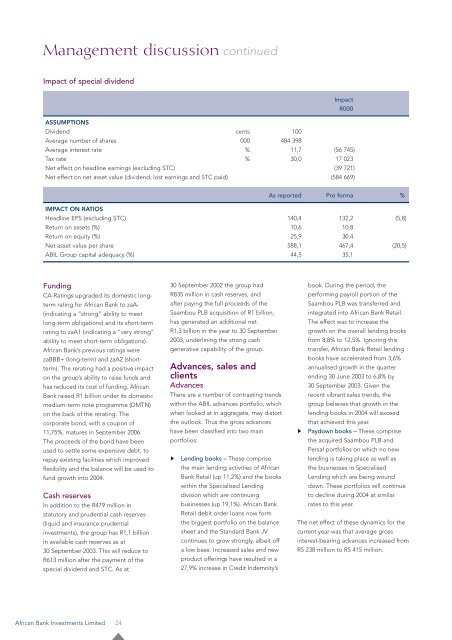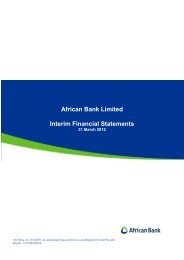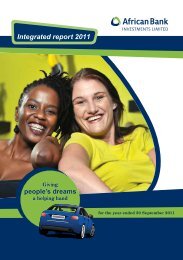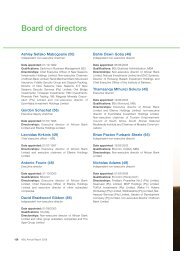Download - African Bank
Download - African Bank
Download - African Bank
Create successful ePaper yourself
Turn your PDF publications into a flip-book with our unique Google optimized e-Paper software.
Management discussion continued<br />
Impact of special dividend<br />
Funding<br />
CA-Ratings upgraded its domestic longterm<br />
rating for <strong>African</strong> <strong>Bank</strong> to zaA-<br />
(indicating a “strong” ability to meet<br />
long-term obligations) and its short-term<br />
rating to zaA1 (indicating a “very strong”<br />
ability to meet short-term obligations).<br />
<strong>African</strong> <strong>Bank</strong>’s previous ratings were<br />
zaBBB+ (long-term) and zaA2 (shortterm).<br />
The rerating had a positive impact<br />
on the group’s ability to raise funds and<br />
has reduced its cost of funding. <strong>African</strong><br />
<strong>Bank</strong> raised R1 billion under its domestic<br />
medium-term note programme (DMTN)<br />
on the back of the rerating. The<br />
corporate bond, with a coupon of<br />
11,75%, matures in September 2006.<br />
The proceeds of the bond have been<br />
used to settle some expensive debt, to<br />
repay existing facilities which improved<br />
flexibility and the balance will be used to<br />
fund growth into 2004.<br />
Cash reserves<br />
In addition to the R479 million in<br />
statutory and prudential cash reserves<br />
(liquid and insurance prudential<br />
investments), the group has R1,1 billion<br />
in available cash reserves as at<br />
30 September 2003. This will reduce to<br />
R613 million after the payment of the<br />
special dividend and STC. As at<br />
<strong>African</strong> <strong>Bank</strong> Investments Limited 24<br />
30 September 2002 the group had<br />
R835 million in cash reserves, and<br />
after paying the full proceeds of the<br />
Saambou PLB acquisition of R1 billion,<br />
has generated an additional net<br />
R1,3 billion in the year to 30 September<br />
2003, underlining the strong cash<br />
generative capability of the group.<br />
Advances, sales and<br />
clients<br />
Advances<br />
There are a number of contrasting trends<br />
within the ABIL advances portfolio, which<br />
when looked at in aggregate, may distort<br />
the outlook. Thus the gross advances<br />
have been classified into two main<br />
portfolios:<br />
Lending books – These comprise<br />
the main lending activities of <strong>African</strong><br />
<strong>Bank</strong> Retail (up 11,2%) and the books<br />
within the Specialised Lending<br />
division which are continuing<br />
businesses (up 19,1%). <strong>African</strong> <strong>Bank</strong><br />
Retail debit order loans now form<br />
the biggest portfolio on the balance<br />
sheet and the Standard <strong>Bank</strong> JV<br />
continues to grow strongly, albeit off<br />
a low base. Increased sales and new<br />
product offerings have resulted in a<br />
27,9% increase in Credit Indemnity’s<br />
Impact<br />
ASSUMPTIONS<br />
Dividend cents 100<br />
Average number of shares 000 484 398<br />
Average interest rate % 11,7 (56 745)<br />
Tax rate % 30,0 17 023<br />
Net effect on headline earnings (excluding STC) (39 721)<br />
Net effect on net asset value (dividend, lost earnings and STC paid) (584 669)<br />
R000<br />
As reported Pro forma %<br />
IMPACT ON RATIOS<br />
Headline EPS (excluding STC) 140,4 132,2 (5,8)<br />
Return on assets (%) 10,6 10,8<br />
Return on equity (%) 25,9 30,4<br />
Net asset value per share 588,1 467,4 (20,5)<br />
ABIL Group capital adequacy (%) 44,5 35,1<br />
book. During the period, the<br />
performing payroll portion of the<br />
Saambou PLB was transferred and<br />
integrated into <strong>African</strong> <strong>Bank</strong> Retail.<br />
The effect was to increase the<br />
growth on the overall lending books<br />
from 8,8% to 12,5%. Ignoring this<br />
transfer, <strong>African</strong> <strong>Bank</strong> Retail lending<br />
books have accelerated from 3,6%<br />
annualised growth in the quarter<br />
ending 30 June 2003 to 6,8% by<br />
30 September 2003. Given the<br />
recent vibrant sales trends, the<br />
group believes that growth in the<br />
lending books in 2004 will exceed<br />
that achieved this year.<br />
Paydown books – These comprise<br />
the acquired Saambou PLB and<br />
Persal portfolios on which no new<br />
lending is taking place as well as<br />
the businesses in Specialised<br />
Lending which are being wound<br />
down. These portfolios will continue<br />
to decline during 2004 at similar<br />
rates to this year.<br />
The net effect of these dynamics for the<br />
current year was that average gross<br />
interest-bearing advances increased from<br />
R5 238 million to R5 415 million.







